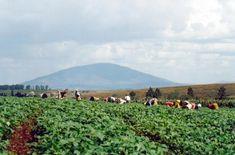


Political and social unrest in Kenya has spread to fresh-produce growing areas threatening the harvest and supplies to the UK and European market.
“Up until the weekend, everything was fine, but then skirmishes because of ethnic rivalries started in Naivasha and since Monday a large part of the workforce has been too scared to come to work and a lot of buses did not run,” said Tiku Shah, of exporter Sunripe and chairman of the Fresh Produce Exporters Association of Kenya (FPEAK).
Shah estimated that worker turnout for harvesting was running at about 50 per cent between Monday and Wednesday but that packing operations were not affected in the same way.
“I am not going to downplay the situation,” Shah told freshinfo. “The situation is very tense, but once mediation began on Tuesday led by Kofi Annan, although there are still skirmishes in non-horticultural areas, there is less tension in Naivasha and things should get better over the next four weeks.”
Exporters have been sending trucks to pick up produce bound for Eldoret international airport at night and under police escort in order to avoid the worst of the violence during the daytime in recent days and weeks, but now warn that a shortage of produce could start to be felt in markets.
“As of now there are not enough people on the harvesting side,” said Shah. “So there might be shortages to come of babycorn and runner beans. But remember, farms are spread out and are not all in the Naivasha and Rift areas so there will still be product from other areas.”
The situation for flower sendings is of particular concern as the Valentine’s Day peak on February 14 looms. “On my farms we have only 20-30 per cent of the workforce,” exporter Vijay Kumar told freshinfo. “It is worst in Naivasha and not so bad in Nyharuru, but it is difficult to manage. I would say that for flowers, yes the situation is concerning.”
And Flamingo Holdings, which owns flower and vegetable farms in the region told the African press that its operations have been affected by the skirmishes and burning road blocks. “We have lost five days of work because there were many blockades on the road,” said Nec Davies, managing director of Finlays Ltd which owns Flamingo Holdings. “Each day we are not sure that the roads are open. We can only ship flowers when the roads are passable.”
But at Flamingo UK group technical director Chris Gilbert-Wood praised the work of his team in Kenya. “They have done a fantastic job in extremely difficult circumstances,” he said. “We have been looking at our truck schedules and working with the freight forwarders, but we have not seen any volumes reduced and have had product despatched from Naivasha and trucked down to Nairobi to be sent to the UK every day this week.” He said the company is making plans for Valentine’s Day and is “optimistic and not anticipating any problems at all”. Flamingo has also kept its customers up to date with developments in Kenya with formal, daily reports.
But workers’ leaders have been much less upbeat and are appealing to the Kenyan government to bring order before the industry - which saw a 64 per cent rise in earnings last year despite food-miles negativity - collapses. “Seventy per cent of flower-farm labour force is provided by workers from western Kenya,” Issa Wafula of Kenya Agricultural and Plantations Workers Union told the African press. “This is why we urgently call on government to restore peace before more damage is done to the farms.”



